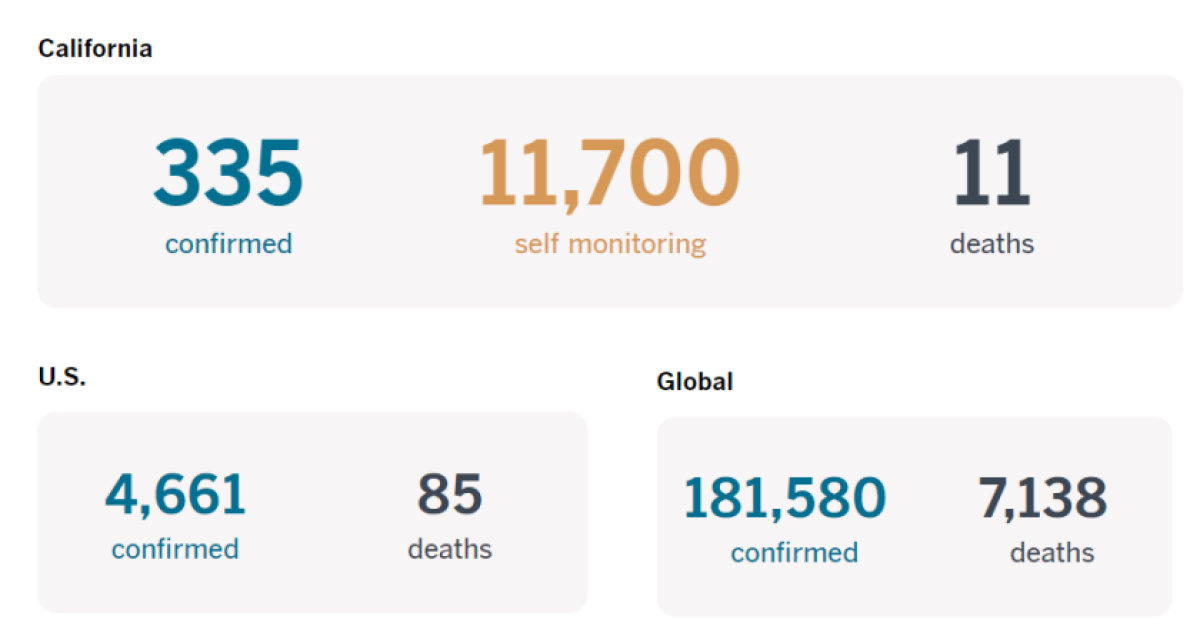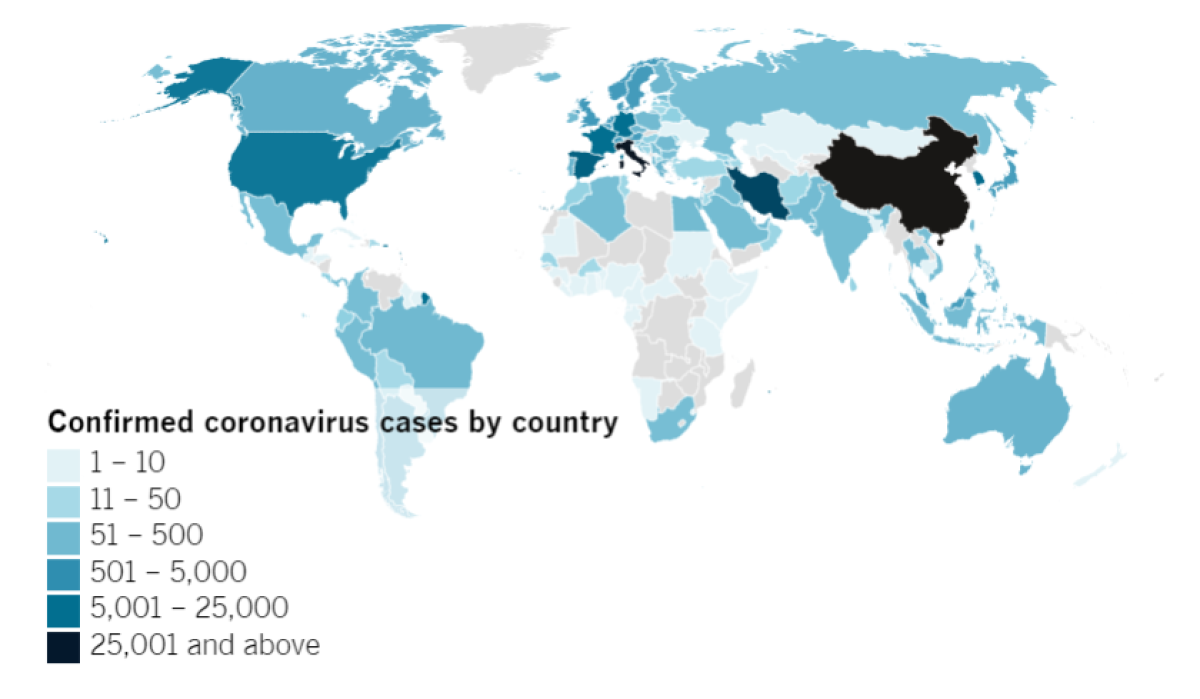Coronavirus Today: Just stay home
Good evening. I’m Diya Chacko, and it’s Monday, March 16. Here’s what’s happening with the coronavirus outbreak in California and beyond, as swaths of L.A. shut down, and the president urges Americans to stay home.
Seven counties in the Bay Area have issued a “shelter in place” order that is expected to last for at least two weeks. Effective midnight, residents will be required to stay at home “except for essential needs,” said San Francisco Mayor London Breed. Only police and fire departments, hospitals, grocery stores, pharmacies and a few other businesses will be allowed to remain open under the shelter-in-place order. Residents will be able to go to out to buy food and other necessities, but San Mateo Mayor Joe Goethals urged residents not to rush, adding that stores will remain fully stocked.
It’s a move that will close virtually all businesses and keep residents at home, but health experts say extreme measures are needed to prevent the virus from overwhelming the healthcare system at a time when it’s most needed. The outbreak is already taking a toll on medical workers and other first responders. Several healthcare workers across California and at least 10 firefighters in San Jose have tested positive for COVID-19, and the Los Angeles Police Department on Sunday confirmed its first coronavirus case.
Announcing new national guidelines on Monday, President Trump called on Americans to avoid gatherings of more than 10 people, stop eating and drinking in bars and restaurants, and halt unnecessary travel or shopping trips. Everyone should assume there are coronavirus patients in their neighborhood, some of whom might not even know they’re sick, said L.A. County Public Health Department Director Barbara Ferrer.
On Sunday, Mayor Eric Garcetti issued an emergency order to close L.A. bars, nightclubs, restaurants — with the exception of takeout and delivery — entertainment venues and gyms, beginning at midnight. Some city services are open, but with restrictions; the L.A. Times is keeping track of what’s open and closed at this link, which is free for everyone to read. In an effort to help residents stuck at home, Los Angeles will temporarily stop ticketing cars during street sweeping and relax its enforcement of some other parking rules, Garcetti said.
In the last few days, chefs have pivoted away from in-restaurant service in favor of heavily pushing delivery and takeout, encouraging people to buy gift cards and branded merchandise, developing meal kits, boxing up unused inventory for sale, offering to cook in people’s homes and flipping restaurant spaces to become retail shops. Several delivery apps have waived commission fees from their partner restaurants, but it may not be enough to stem the loss of much-needed income. One restaurant owner recommends that customers who want to support dining establishments by ordering takeout or delivery first check to see if they can place an order directly with the restaurant over the phone or via email.
Garcetti and representatives of various grocery store chains also said that there was no shortage of food in Los Angeles. He asked that residents allow time for stores to restock and give priority to seniors while waiting in line. L.A. County Sheriff Alex Villanueva said his department would increase the presence of its deputies in the field, with their efforts focused on shopping centers, supermarkets and big-box stores — a precautionary measure “in case there’s any sort of conflict.”
By the numbers
As of 3:59 p.m. PT Monday, there were:

Track the latest numbers and how they break down by county and by state with our graphics here.
Where is the coronavirus spreading?

Your support helps us deliver the news that matters most.
Across California
Gov. Gavin Newsom and California lawmakers unveiled a plan Monday to spend as much as $1 billion on the state’s emergency medical response, including opening new hospitals and buying equipment. Officials have said preparing the healthcare system is vital, particularly given the public breakdown in Italy, where hospitals lack the beds, equipment or workers to care for so many sick people.
The money would also be used to help nursing homes and childcare facilities needing deep cleaning, and to aid seniors who have been asked to practice home isolation. Some of the funds would be used to buy hotel beds for people who are homeless. Newsom has promised to prioritize protecting homeless people, and in Los Angeles, hand-washing stations are coming to encampments around the city, as outreach workers adopt new protocols to minimize the risk of introducing infections.
So far, fewer than 9,000 coronavirus tests have been conducted throughout the state. Newsom said Sunday he hopes to quickly ramp up testing as more commercial labs come online.
In Los Angeles, shoppers from immigrant communities know that swap meets and street-vendor rows can be a last-ditch option for household cleaning and hygiene items at basement-level prices. But the panic-buying of toilet paper and other essentials is throwing the bath tissue market into disarray at every level.
Due to rapidly changing guidance and restrictions from health agencies, L.A. school officials have halted a plan to open 40 family resource centers, instead making available 60 grab-and-go food centers.
All L.A. County court proceedings will be suspended for the rest of the week. The sheriff’s department is releasing some inmates from its crowded jails, although there are not yet any confirmed cases of COVID-19 there. Deputies have been directed to cite and release people when they can and would need to obtain medical clearance before booking anyone who showed symptoms, said Sheriff Alex Villanueva.
How to stay safe
— Wash your hands for at least 40 to 60 seconds. It’s a better protective measure than a mask.
— Stop touching your face, and keep your phone clean.
— Watch for these symptoms of possible infection: fever, cough, shortness of breath.
— If you’re sick, stay home. If you’re worried you might be infected, call your doctor or urgent care clinic.
— Know your labor rights, from working from home to paid sick leave. In California, employees who meet certain requirements are entitled to at least three days of paid sick leave; several cities provide more.
— Experts still aren’t sure whether pets can get the coronavirus. Pet owners who contract the coronavirus should isolate themselves from their animal companions out of an abundance of caution.
— Wondering whether you should self-quarantine? Here’s our guide, along with tips on how to stock up in advance. You can also watch our video guide on YouTube.
Around the nation and the world
Scientists at the Kaiser Permanente Washington Research Institute in Seattle began a first-stage study of a potential COVID-19 vaccine, developed in record time. Although the National Institutes of Health says a vaccine likely wouldn’t be available for widespread use for 12 to 18 months, Monday’s milestone marks the beginning of a series of studies in people needed to prove whether the shots are safe and effective.
Canada is restricting entry of most noncitizens into the country, with the exception of Americans. However, all who enter the country from abroad are being asked to self-isolate for 14 days. In the U.S., Florida, Illinois, Arizona and Ohio to hold their presidential primary elections Tuesday, but Ohio’s has been thrown into doubt by concerns about the virus.
U.S. gun sales are surging even in areas not as affected by the outbreak, with some first-time gun buyers fearing an unraveling of the social order, and some gun owners worried that the government might use its emergency powers to restrict gun purchases. But gun control groups have raised concerns about children out of school for the next several weeks, which could result in more children and teens being killed in homes with unsecured guns.
In a radical departure from longtime movie industry practices, Universal Pictures on Monday said it would make its movies available for streaming in the home on the same day as their global theatrical releases. The company will also make movies that are currently in theatrical release available on-demand beginning as early as Friday.
Your questions answered
Today’s question comes from David Caskey, who wanted to know about immunity to the coronavirus after exposure. Reporter Alice Su spoke to scientists inside and outside of China for answers.
In general, after a person has recovered from COVID-19 or another virus, they usually have some immunity to it, at least for a while. Reports out of China initially seemed to indicate that some people could become reinfected after having recovered, but scientists said testing errors might have been to blame for those results.
“If you get an infection, your immune system is revved up against that virus,” said Dr. Keiji Fukuda, director of Hong Kong University’s School of Public Health. “To get reinfected again when you’re in that situation would be quite unusual unless your immune system was not functioning right.”
Got a question? Our reporters covering the coronavirus outbreak want to hear from you. Email us your questions, and we’ll do our best to answer them. You can find answers to other common questions in our morning and midday roundup.
For the most up-to-date coronavirus coverage from The Times, visit our live updates page, visit our Health section and follow us on Twitter and on Instagram.




